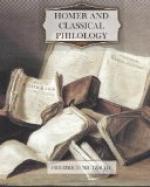The Iliad is not a garland, but a bunch of flowers. As many pictures as possible are crowded on one canvas; but the man who placed them there was indifferent as to whether the grouping of the collected pictures was invariably suitable and rhythmically beautiful. He well knew that no one would ever consider the collection as a whole; but would merely look at the individual parts. But that stringing together of some pieces as the manifestations of a grasp of art which was not yet highly developed, still less thoroughly comprehended and generally esteemed, cannot have been the real Homeric deed, the real Homeric epoch-making event. On the contrary, this design is a later product, far later than Homer’s celebrity. Those, therefore, who look for the “original and perfect design” are looking for a mere phantom; for the dangerous path of oral tradition had reached its end just as the systematic arrangement appeared on the scene; the disfigurements which were caused on the way could not have affected the design, for this did not form part of the material handed down from generation to generation.
The relative imperfection of the design must not, however, prevent us from seeing in the designer a different personality from the real poet. It is not only probable that everything which was created in those times with conscious aesthetic insight, was infinitely inferior to the songs that sprang up naturally in the poet’s mind and were written down with instinctive power: we can even take a step further. If we include the so-called cyclic poems in this comparison, there remains for the designer of the Iliad and the Odyssey the indisputable merit of having done something relatively great in this conscious technical composing: a merit which we might have been prepared to recognise from the beginning, and which is in my opinion of the very first order in the domain of instinctive creation. We may even be ready to pronounce this synthetisation of great importance. All those dull passages and discrepancies—deemed of such importance, but really only subjective, which we usually look upon as the petrified remains of the period of tradition—are not these perhaps merely the almost necessary evils which must fall to the lot of the poet of genius who undertakes a composition virtually without a parallel, and, further, one which proves to be of incalculable difficulty?
Let it be noted that the insight into the most diverse operations of the instinctive and the conscious changes the position of the Homeric problem; and in my opinion throws light upon it.
We believe in a great poet as the author of the Iliad and the Odyssey—but not that Homer was this poet.
The decision on this point has already been given. The generation that invented those numerous Homeric fables, that poetised the myth of the contest between Homer and Hesiod, and looked upon all the poems of the epic cycle as Homeric, did not feel an aesthetic but a material singularity when it pronounced the name “Homer.” This period regards Homer as belonging to the ranks of artists like Orpheus, Eumolpus, Daedalus, and Olympus, the mythical discoverers of a new branch of art, to whom, therefore, all the later fruits which grew from the new branch were thankfully dedicated.




